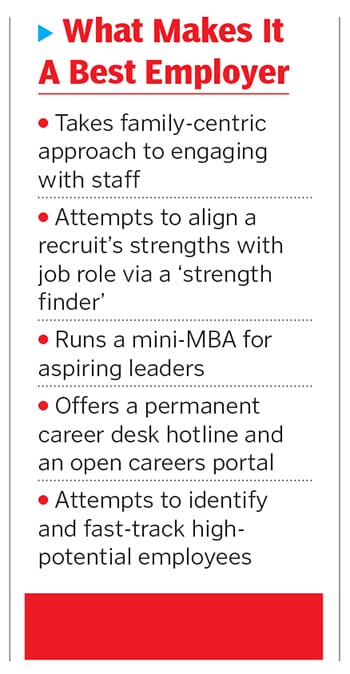How AGS Health nurtures talent
AGS Health nurtures employees right from induction and fosters an ambience to let them flourish within the organisation


 Smita Venkataraman, VP—HR, says that the company tweaks and customises training methodology for every fresh recruit[br]Given that AGS Health operates in the people-intensive world of India’s back-office process outsourcing industry, it’s perhaps no coincidence that the company puts a premium on people. Not just in the bevy of hospitals, clinics, academic medical centres and doctors to whom it provids revenue cycle management services, but also the over-5,900 employees that are on its rolls.
Smita Venkataraman, VP—HR, says that the company tweaks and customises training methodology for every fresh recruit[br]Given that AGS Health operates in the people-intensive world of India’s back-office process outsourcing industry, it’s perhaps no coincidence that the company puts a premium on people. Not just in the bevy of hospitals, clinics, academic medical centres and doctors to whom it provids revenue cycle management services, but also the over-5,900 employees that are on its rolls.
Their annual staff churn is in the mid-twenties, says Smita Venkataraman, vice president for Human Resources (HR) and corporate communications, in an industry where the upper end of the range is as high as 50 percent.
About 85 percent of the company’s recruits are fresh graduates, and AGS believes it’ll have greater recall if it involves their families right from Day 1. “Smart people typically have multiple job opportunities when they come out of campuses, so we always want to be on top of their mind,” says Venkataraman, “which happens if the families are involved.” Hence, AGS invites parents of prospective recruits to visit the company’s centres, giving them a tour that offers a glimpse of the life their children will have once they join.
Once the graduates are recruited, AGS believes in letting them pick their strengths instead of fitting them to a template and hoping they would develop those skills by and by. “Every individual will have some innate strength and as an organisation we need to quickly identify it and map the roles in such a way as to tap those strengths,” Venkataraman says. During induction, there is a ‘strength finder’ exercise that AGS’s trainers put the new recruits through there’s even a detailed train-the-trainer programme that helps the trainers teach recruits in ways that are in-sync with the way the recruits learn. This means the training methodology is flexible and can be tweaked from one recruit to the next.
At the middle management levels, AGS uses psychometric personality tests to understand the most natural leadership styles of different employees. This brings out the motivators and stressors of individual managers and helps the company align their roles better.
For those looking for a change of roles, AGS maintains a permanent careers desk with a hotline that employees can use to find lateral and upward movement within the company. A permanent careers portal is also maintained on which staff can get information on a host of career-related areas—from new jobs that have opened up within the company to inter-city transfers.
The portal also details out a career map covering over 100 roles in the company that are mapped to 12 different competencies—domain expertise, process orientation, team-leading skills, analytical thinking, and strategic outlook are examples of the competencies. Just by looking at this visually, employees know what they need to do and the time it will take them to qualify for the new role.
A programme called Launchpad caters to those aspiring to leadership roles and AGS also has in place a ‘high-potentials’ identification programme that pays extra attention to its selectees through job rotations, mentoring, interactions with current leadership etc.
AGS has an in-house leadership development institute that runs a modular mini-MBA. The modules, focussing on different competencies, are run on a monthly basis and are delivered over multimedia channels, including an app. Through this initiative, AGS manages to find more than 90 percent of its leaders from within the organisation.These also help the 55-member HR team become business oriented as well. “We don’t want to be seen as a transaction partner, we want to be viewed as a business enabler,” Venkataraman says. The HR team measures its own performance on four metrics—revenue, margins, retention and reference-ability. Some of the questions they keep asking is whether the money spent on talent is getting the most out of it, if the company has employees with higher skills, if it is delivering higher revenue, if the best people are retained, and if employees are saying good things about the company to the outside world.
“Global outsourcing has become an attractive strategy for US-based healthcare providers, who are increasingly focused on core clinical activities,” says Scott Williams, associate vice president, patient revenue management organisation at Duke University Health System, a customer of AGS. He adds that a limited supply of qualified US-based employees is forcing healthcare providers to consider and adopt outsourced RCM services.
Williams says: “AGS Health provides tangible benefits reflected in revenue lift and improved profitability to clients.” According to him, the company has high standards of quality, security and compliance, and the ability to get up to speed in operational support. They also offer, he says, deep experience across major clinical specialties and billing systems.
Devendra Saharia, the founder and CEO of the company, says that the emergence of AI and machine learning in the IT and IT-enabled services industry will be transformational in the next five to ten years. While this could mean greater automation and some roles being eliminated, companies such as AGS will get the opportunity to provide more value-added services such as analytics. This will require more higher-order thinking and could in turn generate new roles. “We have a young, highly-scalable workforce that can learn very quickly,” Saharia says.
First Published: Aug 05, 2019, 09:49
Subscribe Now